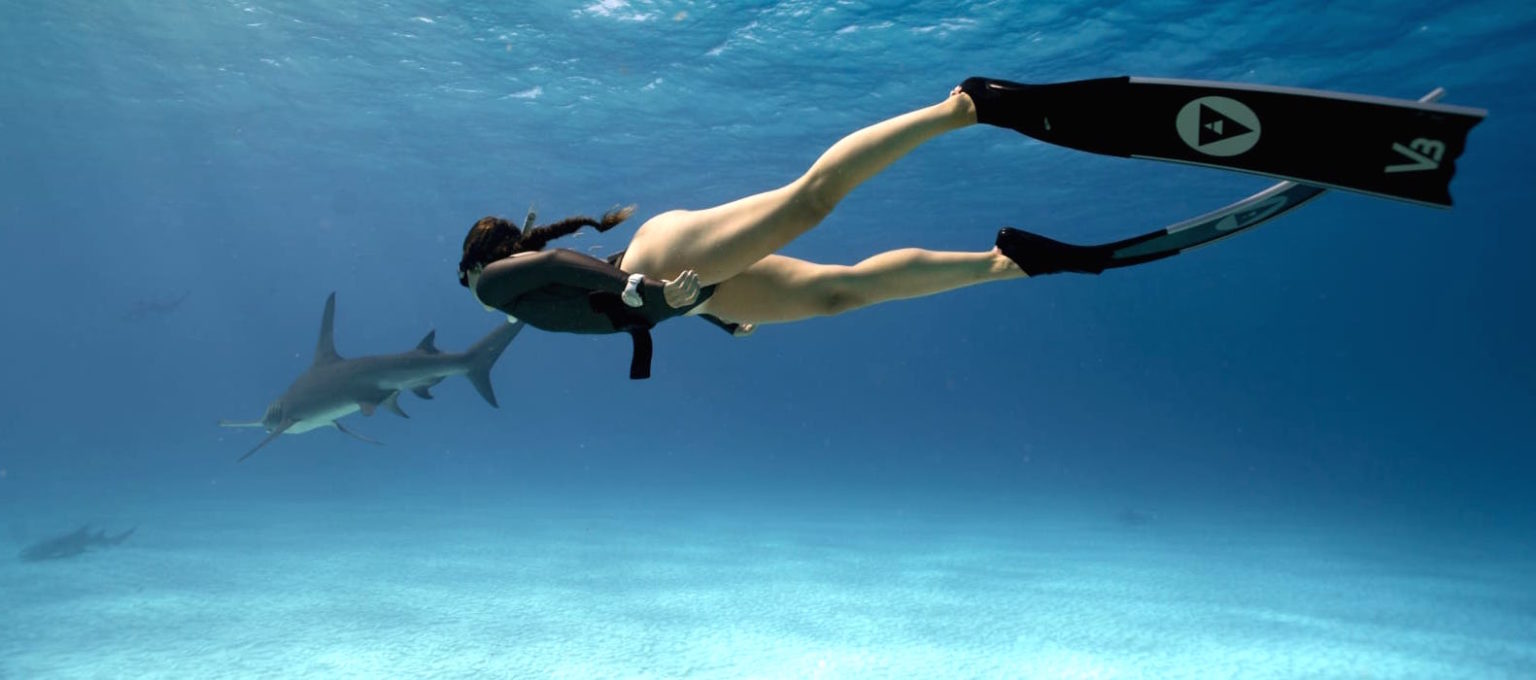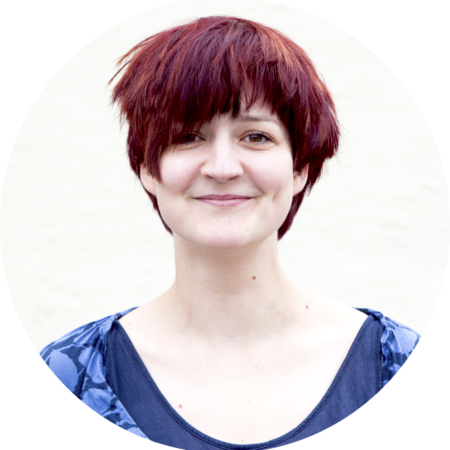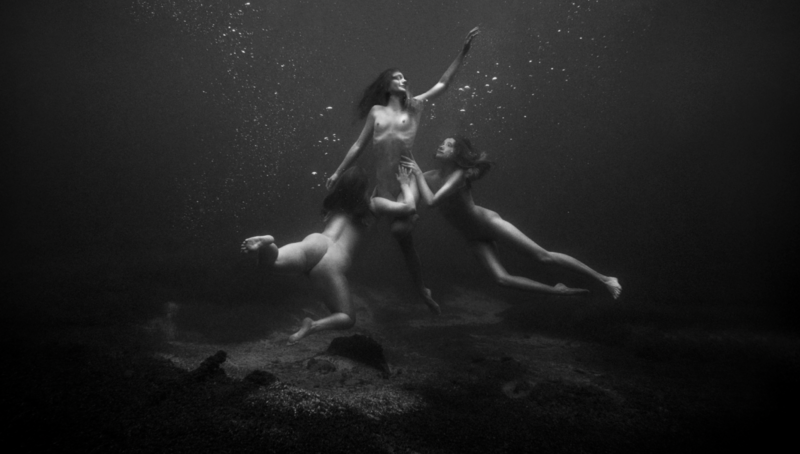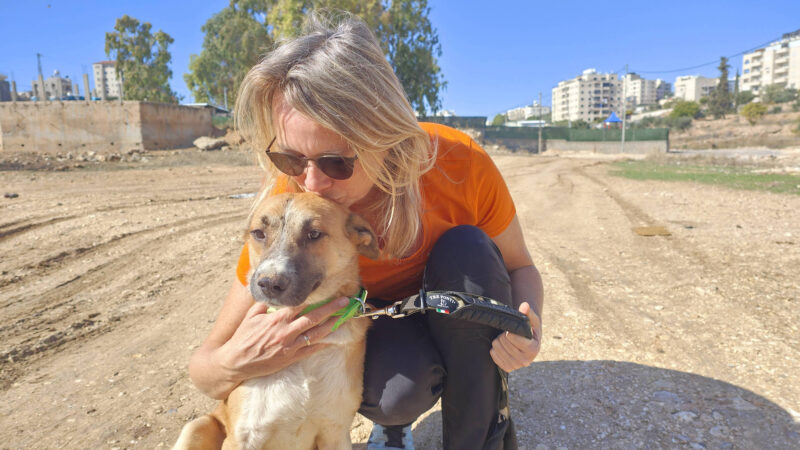28-year-old freediver Sofía Gómez Uribe has set three world records and several Pan–American and South American records for her home country of Colombia. She wants to get more people interested in this sport – and infect them with her love for the oceans.
By Katharina Wojczenko, Bogotá
On 5 July 2017, Sofía Gómez Uribe slipped into the water in her blue wetsuit and fins in a bay on the small Caribbean island of Dominica. Two minutes and 43 seconds later, she came back to the surface. She had dived to a depth of 83 metres – using only the air she drew before. A world record. Two days later, she beat it by another metre. Just over a year later, she managed a depth of 86 metres in Kaş, Turkey. Another world record.
Since then, Sofía Gómez Uribe has been a star in Colombia – as far as that is possible in a niche sport like freediving. On average, only around 200 people compete in worldwide freediving competitions. A beaming Sofía appeared in the media after winning her records and explained to the audience what apnoea diving actually is.
Apnoe diving:
In apnoea diving, also known as “freediving”, there are various categories: with fins, with a monofin, without fins, with and without weights, in a horizontal pool or vertically. It’s all about three factors: How long? How far? How deep? Deep diving with constant weight and fins is the competition category in which Sofía Gómez set the world records.
Constant weight, because divers do not carry any additional weight on their bodies that pulls them down and which they shed before ascending. Freediving is not only a modern sport, but also an ancient cultural technique. Even in the Stone Age, apnoea divers collected shells, sponges and pearls in the depths. Hunting fish underwater with spears is still practised worldwide today.
“I always say it’s like freedom on probation. I feel happy and free in the water. But I also savour every moment of the dive because I know it will end soon. It has to end because I have to breathe again,” says Gómez. Her mantra when diving: peace, love, calm and blue. “Apnoea is an encounter with myself. When I dive for training or for fun, the water gives me euphoria, peace, calm – and lots of time to think about all sorts of things… about my life.”
It’s different in competition of course. But even there, the tension must not get out of hand. The adrenaline that drives other competitive athletes to peak performance is poison for apnoea divers. The heart rate increases, the blood vessels dilate and more oxygen is consumed. That’s why breathing exercises, diaphragm training and meditation are at least as important as strength and endurance.
Sofía Gómez has neither a bigger heart nor bigger lungs than others. This has been confirmed by researchers at Parque Explora in Medellín, who measured her in the water. The average person can hold their breath in water for 30 to 60 seconds. Not much longer because the brain and heart are connected. When holding your breath, the brain triggers an acceleration of the heartbeat and the arteries dilate. This leads to more oxygen being transported and utilised more quickly.
Sofía Gómez is different: thanks to her training, she manages to disconnect her heart from her brain. After 60 seconds, her heart rate drops to 30 beats per minute and her blood pressure remains constant. “She goes into a kind of hibernation and that way she can carry on,” the research team diagnosed. Sofía Gómez can currently hold her breath for 5 minutes and 8 seconds. Seems like time is the least of her problems.
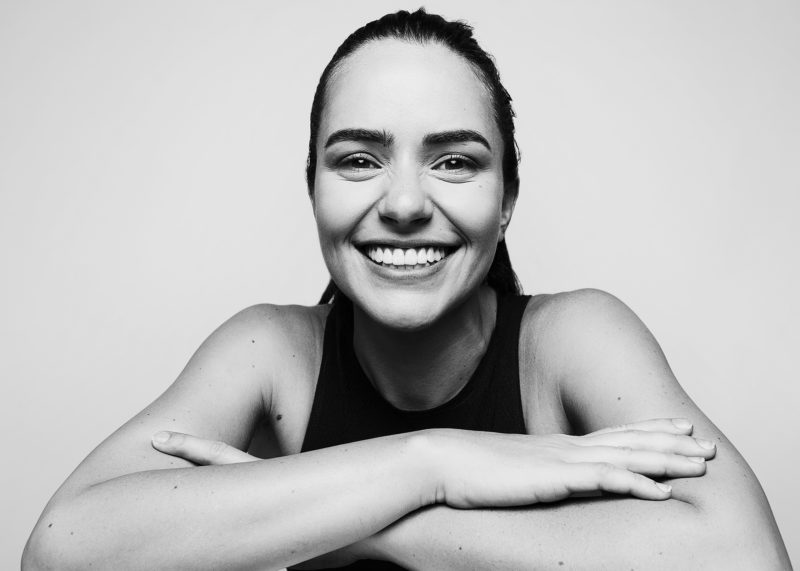
The pressure on her body, which she has to equalise, is more difficult to cope with. To enable her to dive so deep, her lungs are compressed to the size of an orange. To do this, she has to acclimatise her body to the depths for weeks before a competition. Otherwise there is a risk of the two typical injuries suffered by divers: ruptured eardrums and barotrauma, tears in the lungs caused by errors in equalising the pressure.
Sofía Gómez Uribe grew up in a middle-class housing estate in the small town of Pereira in Colombia’s Coffee Axis, surrounded by mountains, hundreds of kilometres from the sea. When she talks about her childhood, it sounds idyllic – all the more so because the armed conflict between the government, guerrillas and paramilitaries was raging in the country at the same time.
Her father comes from the coffee region, is a farmer and runs a wholesale business for fruit and vegetables. Her mother comes from Santa Marta on the Caribbean coast, studied technical drawing and is a housewife. It was always important to both of them that their two daughters receive a good education, study – Sofía Gómez is a civil engineer – and do sport. Sofía Gómez started synchronised swimming at the age of ten, but quickly switched to swimming with fins.
When her coach had her dive for practice, she managed 100 metres from the word go. That was the first time she realised that she had a talent for holding her breath. Apnoea immediately appealed to her, says Sofía Gómez. When she tried it out in the sea under supervision at the age of 21, she again proved to be a natural. However, when her swimming coach refused to train her in apnoea, she prepared for her first competition on her own.
Sofía and the sea – if you listen to her descriptions, it’s almost like a love affair: “There was a special connection straight away. I was never afraid of the deep, of the dark. Many people have something against the dark, but it reassures me.” Apnoea is very personal, even selfish in a way, she says – “but what I like most is sharing this experience with others“. She gives talks, does Instagram livestreams with whale experts and oceanographers and talks about plastic in the oceans. And above all, she publishes photos and videos of herself in the sea.
“I can change the view of people who don’t have the same access to the sea as I do,” explains Gómez. “I love sharks, for example, but many people are very afraid of them. That’s why I share photos and videos with sharks. I show them that sharks are not man-eating machines. With what I do, I can teach people a little bit to love the oceans and understand that they are very important for everyone.”
Most important sources of income: Sponsors and advertising contracts
The pictures and the publicity are also important for another reason. “I’m an athlete, but I don’t earn any money from it – at least not in Colombia,” says Sofía Gómez. That’s because the Colombian underwater sports federation “Fedecas” doesn’t have any to give its athletes. The situation is similar at the world diving federation CMAS. Qualifications for world championships, gold medals, world records: none of this earns the divers any bonuses. Sofía Gómez lives off the goodwill of sponsors and advertising contracts. In the future, she hopes to add her apnoea school as a source of income. “Thank goodness for social media,” says Gómez, “it’s a way to earn a living that didn’t exist before.”
She moved back to Colombia because of her sponsors. She previously lived on the small Caribbean island of Dominica for two years, just five minutes away from a 150 metre deep bay. Perfect for training, but extremely inconvenient to reach. What’s more, sponsors pay in pesos, but on the island the currency is dollars, which is why everything is three times more expensive than in Colombia. And when Hurricane María swept over the island, she had no internet for 15 months.
In regards to sponsors there is almost equality in her sport. In performance terms, it’s a different matter. No matter how hard the free-diving women try: They will never be able to dive as deep as the best men. Simply because male lungs are bigger. Gómez takes this in her stride. Yet there is something that clearly annoys her: “In every sport, the achievements of men are glorified more than those of women.” Football, she says, is a prime example.
She hopes to be a role model for girls and women. “I would be happy if I had an influence on others. I like to inspire other people to overcome their fears. I always say: I can dive 97 metres deep without breathing and come back up again. No matter what you try, it can’t be as difficult as that! You think what I’m doing is impossible. But I can do it. So with work and discipline, you can do everything you want to do.”
The calm after the shitstorm
In Colombia, she is regarded as an approachable top athlete. This also has to do with her presence on social media. Her popularity is so great that an app provider developed special meme stickers for WhatsApp with her likeness.
But Gómez has also learnt about the darker side of publicity. In February, Twitter users published ten–year–old tweets in which Gómez had complained about Afro–Colombians who were apparently making noise in her neighbourhood. A shitstorm with accusations of racism broke out against her.
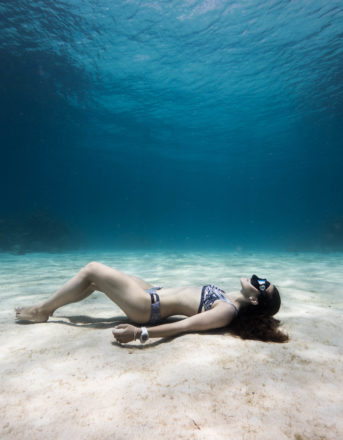
Gómez published a video in which she tearfully says: “Life has taught me to put myself in the shoes of others. I have realised that I have made many of my comments from a position of privilege. To those who (…) are disappointed in me, I apologise. We all make mistakes, but we also have the right and the duty to change.” Some doubted her change of heart and suspected she was just trying to save her image. Others saw human greatness and a willingness to learn. After all, she was only 17 years old when the criticised statements were published.
In any case, this experience has changed Sofía Gómez’ approach to social media. A year earlier, she had described herself as a “total twitterer” and said that she read every comment and replied to most of them. She deleted unpleasant comments and blocked the profile. It took her hours every day. “It was an obsession,” she says. “Today I think that someone will always say something against me. Why do I have to care so much what other people think about me? You forget who you are because you think you are what others think of you.”
On Twitter, she deleted the apology video and everything after 11 February 2020 and no longer posts anything. She concentrates on Instagram, where she now has more than 330,000 followers. She shows beautiful pictures of herself underwater, advertises, talks self-deprecatingly in her Insta-Live about how she removes her moustache, bakes biscuits and takes part in discussions about marine animals and protecting the oceans. Through it all, she radiates serenity and positive energy.
And she needs it too: due to the Covid-19 quarantine, she hasn’t trained in the water for months because all swimming pools and airports are closed; her main sponsor – a bank – has cancelled her contract due to the crisis. All competitions have been postponed indefinitely. Her world records are no longer valid. It was hard when she was unable to compete in 2019 due to an injury and witnessed as a commentator how another diver beat her world record.
“It’s demotivating to realise that you were at that point and you’re no longer there. But it also motivates you to keep training and improving,” says Sofía Gómez. “It could be that I break another world record and become the best again.” She used to do everything she could to be the best and win. Today, her health takes priority. She wants to heal injuries properly and progress at her own pace so that she can continue her sport into old age. But even though she has become more sensible than before, her ambition remains. The next goal: to dive 100 metres without taking a breath.

